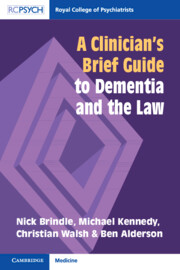Book contents
- A Clinician’s Brief Guide to Dementia and the Law
- A Clinician’s Brief Guide to Dementia and the Law
- Copyright page
- Contents
- Preface
- Common Abbreviations
- Chapter 1 Dementia
- Chapter 2 Dementia
- Chapter 3 Dementia
- Chapter 4 The Mental Capacity Act 2005
- Chapter 5 The Mental Health Act 1983
- Chapter 6 The Care Act 2014
- Chapter 7 Assessment of Capacity
- Chapter 8 The Diagnosis of Dementia
- Chapter 9 Care and Treatment Issues and the Law
- Chapter 10 Deprivation of Liberty
- Chapter 11 Discharge from Hospital
- Chapter 12 Abuse and Safeguarding
- Chapter 13 The Courts and Tribunals
- Chapter 14 The Interface between Dementia and the Criminal Justice System
- Book part
- References
- Index
Chapter 13 - The Courts and Tribunals
Published online by Cambridge University Press: 20 July 2023
- A Clinician’s Brief Guide to Dementia and the Law
- A Clinician’s Brief Guide to Dementia and the Law
- Copyright page
- Contents
- Preface
- Common Abbreviations
- Chapter 1 Dementia
- Chapter 2 Dementia
- Chapter 3 Dementia
- Chapter 4 The Mental Capacity Act 2005
- Chapter 5 The Mental Health Act 1983
- Chapter 6 The Care Act 2014
- Chapter 7 Assessment of Capacity
- Chapter 8 The Diagnosis of Dementia
- Chapter 9 Care and Treatment Issues and the Law
- Chapter 10 Deprivation of Liberty
- Chapter 11 Discharge from Hospital
- Chapter 12 Abuse and Safeguarding
- Chapter 13 The Courts and Tribunals
- Chapter 14 The Interface between Dementia and the Criminal Justice System
- Book part
- References
- Index
Summary
Clinicians need to be vigilant about whether the court’s intervention is required because of a dispute or specific legal requirement in relation to their patient. Circumstances may arise when it is necessary to obtain authority from a court regarding the lawfulness of a treatment (either to be given or withdrawn) when a patient refuses, lacks capacity or there is a difference of opinion regarding best interests. In other cases, a judgment from the court may protect a clinician from claims that they have acted unlawfully. Of course, the courts are also there to safeguard the welfare of the patient. We discuss the role of the First-Tier Tribunal (Mental Health) and that of decision-making capacity of patients to participate in tribunal proceedings. We then explain the Court of Protection and its powers, and the pathways for application to the court, as well as the evidence that a clinician may be required to provide. We consider common health and welfare cases that the Court of Protection may be asked to decide on and then discuss the role of the inherent jurisdiction of the High Court in protecting the vulnerable but capacitous.
Keywords
- Type
- Chapter
- Information
- A Clinician's Brief Guide to Dementia and the Law , pp. 129 - 143Publisher: Cambridge University PressPrint publication year: 2023



